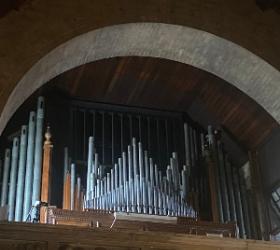
Whereas Das Orgelbüchlein means “The Little Book for Organ,” Das Orgeleinbuch is “The Book for a Little Organ.” As much as I love a four-manual E. M. Skinner, I am equally thrilled when I play historic, one-manual organs in Europe. Sometimes the keyboard offers only 45 notes. But what of it? An architect once told me, “The hardest plot to design for is an unflawed perfect square.” Did not Michelangelo carve David out of a damaged hunk of marble? (That’s why David is leaning slightly to one side.) In the same way, these organs need not be restricting—they can be liberating.
However, what do you play on them? Since the time of Vierne, reams of “manuals only” music have been written. Unfortunately little of it is effective, if even playable, on these instruments. I was determined to fill this void, creating music not constrained by these limitations but, instead, inspired by them.
The Orgeleinbuch runs the gamut of styles—fugues, chorale preludes, Gregorian preludes, and dance movements. The ecclesiastical preludes touch on each of the major Christian seasons (Advent, Christmas, Lent, etc.), while the dance movements aren’t ecclesiastical at all. Some preludes will be playable on Italian and Spanish organs with divided keyboard. (Some fabulous duos can be played with a 16' in the right hand and a 4' in the left, or a Cornet in the right hand and a reed in the left.) However, most of the preludes assume one undivided keyboard. Not one work in Orgeleinbuch will require pedal. This first installment is Jerusalem, Quae Ædificatur, op. 193, no. 1.




